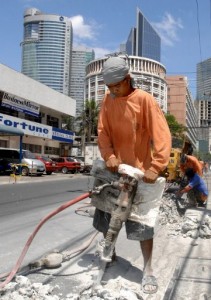2,132 public works projects get the green light

A laborer works on a road project in Manila in this file photo. The Department of Public Works and Highways (DPHW) has bid out 2,227 contracts, or 91 percent of the 2012 lineup, according to Budget Secretary Florencio B. Abad. AFP PHOTO/JAY DIRECTO
The government is ready to implement additional infrastructure projects as the Department of Public Works and Highways (DPHW) has bid out 2,227 contracts, or 91 percent of this year’s lineup, according to Budget Secretary Florencio B. Abad.
Abad said in a statement that of the total, 2,132 projects had been given notices to proceed while 815 local projects had been completed.
Of the projects given the go-ahead, three cost more than P150 million, 162 cost between P50 million and P150 million, and 1,967 cost less than P50 million.
“(These accomplishments so far) will certainly allow the DPWH to absorb the construction of more infrastructure projects in the second semester of the year,” he said.
“The DPWH’s accomplishments are well-timed, given that the monsoon season has begun and the need to step up public construction is particularly urgent,” he added. “We can therefore expect more progress in the completion of key infrastructure projects in the coming months.”
The budget chief said the issuance of notices to proceed allows the DPWH to receive the corresponding funds to jumpstart project implementation.
He said appropriations for projects with such notices now amount to P48.23 billion, or three-fourths of the total programmed amount of P64.65 billion under the 2012 national budget.
He also said that preparation for infrastructure projects was faster this year due to efforts of the Aquino administration to speed up the implementation of public works.
“For instance, the DPWH was tasked to bid out all infrastructure programs short of award by the end of 2011,” Abad said. “This allowed the agency to begin the implementation of several programs the moment the new fiscal year began.”
Further, Abad said an additional P5 billion is being validated for the implementation of projects that involve national roads that lead to tourism zones.
Abad said these roads will not only improve the exchange of goods and key social services, but will also increase access to tourism zones.
In turn, improved access will “contribute significantly to the economy and provide immediate benefits to communities in tourism zones,” Abad said.
